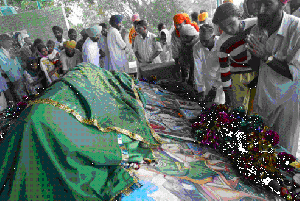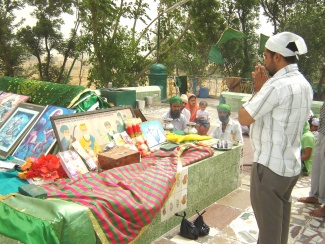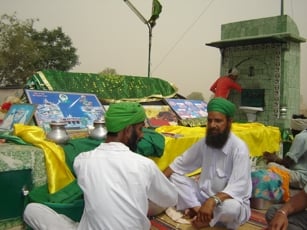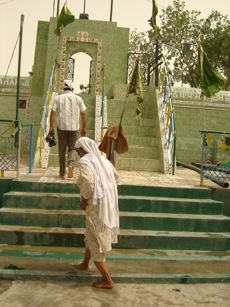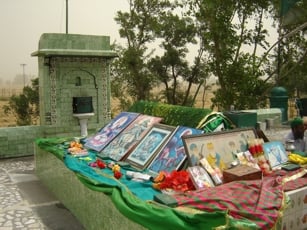Sheikh Brahm
Sheikh Brahm, generally known as Sheikh Farid (II) also known as Farid Sani or Shaikh Brahm Sahib or Farid the second or Salis Farid or arbitrator Farid or Shaikh Brahm the elder or Bal Raja or Shah Brahm , Sheikh Brahm who was the eleventh in succession to Baba Farid Ganjshakar. See Sheikh Farid a mausoleum of a Sufi saint that lies just on the India-Pakistan border in Punjab to pay obeisance. The mausoleum of Pir Baba Sheikh Brahm lies near Mianwali Uttar village in the Khemkaran sector on the Indian side of Punjab.
According to villagers, the Pir Baba was a disciple of Guru Nanak. Legend has it that Guru Nanak visited Sheikh Brahm before heading for Mecca.
The Sheikh asked the Guru to explain,"You say ,'There is only one God, why should there be a second?', and I (Sheikh) say:
There is one Lord and two ways; Which shall I adopt, and which reject?"
The Guru replied:
| SGGS Page 1291 Full Shabad |
| There is one Lord and one way;
Adopt one and reject the other. Thou art the tablet, O Lord, Thou art the pen, and Thou art the writing, Speak of the one God; O Nanak, why should there be second. Var Malar ki Mohalla 1, 28-2, p-1291 |
Shaikh Brahm died on the 21st of Rajab A.H 960 (1552 A.D) after a spirtual reign for 42 years. The Khulasat-ul-Tawarikh states he was buried in Sarhind. He had two sons who are Shaikh Taj-ul-din Mahmud a great saint and another Shaikh Munawwar Shah Shahid. Shaikh Brahm had several disciples, such as Shaikh Salim Chishti Fatahpuri, Shaikh Almadi of Chunian, Baba Ahmad Lanak of Dipalpur, Maulvi Jalal-ul-Din of Shaikhabad, Shah Abdul Fatah of Ghazipur, Haji Niamat Ulla of Shaikhupur, etc.
Guru Nanak Dev Ji And Sheikh Brahm Sakhi
Guru Nanak Dev:: Life and Teaching At Pakpattan:: Discourse with Sheikh Brahm by Kartar Singh M.A.
Leaving Sajjan to follow the path shown to him (Nanak) and charging him with the duty of reclaiming others, the Guru turned towards east. Travelling by short stages and preaching his message to the people in all places, he reached Pakpattan, then called Ajodhan, in the southern part of the Punjab, now in Pakistan. There he proceeded to visit the shrine of Sheikh Farid, a renowned Muslim Faqir. A saint named Sheikh Brahm (Ibrahim) was then the incumbent of the shrine. On reaching there, the Guru learn that sheikh brahm or sheikh farid II, was out in the woods, doing server penance in order to acquire religious merit and obtain a glimpse of the Lord. We have seen that it was the Guru's want to seek out men who were either engrossed too deeply in vicious pleasures of the world, in utter forgetfulness of the higher needs of their souls, or were too much absorbed in painful, misguided attempts at emancipation of their souls, torturing and starving their bodies in hopes of winning salvation and neglecting altogether their duties as men towards their fellow beings. He would meet them, discuss things with them, throw light on their inner selves and give them such an impression of life, of love, of divine beauty and goodness of moral endeavour and excellence, that all which they had till then regarded as of paramount importance lost all significance, receded into the shade and they had no longer the will or desire to think, feel or do, save as he would have them do. Lightning thus a holy flame within their selves, he deciphered them to themselves and set them steady on the path of balanced growth of the body, mind and soul. The tale of the severe, voluntary suffering undergone by the Sheikh induced the Guru to find him out and show him the right and glorious way to attain his goal. He met him in the thick of a deep forest, far away from Human habititions. On seeing the Guru, who he knew to be a religious man, dressed in secular costume like an ordinary householder he said:-
either seek for high positions or for God, put not your feet on two boats, lest you should be drowned and your goods be lost
By this he meant that one should lead either secular or religious life. He should not combine bot. It was impossible for a householder to find God. The Guru replied:-
| SGGS Page Full Shabad |
| Put your feet on both boats and your goods also on the two.
One boat may sink, but the other shall cross over. For me there is no water, no boat, no wreck and no loss: For the True one, O Nanak, is my wealth and property, And He is spontaneously everywhere contained |
The Sheikh thereupon referred to the dangers and obstacles besetting the path recommended by the Guru: the infatuation which the world's allurements or Maya may exercise and thus obstruct the seeker's progress towards God realization: He said:-
| SGGS Page Full Shabad |
| O Farid,the world is enamoured of the witch, who is found to be false when her secret is known.
Nanak, while you looks on, the field is ruine |
In the reply the Guru said:-
| SGGS Page Full Shabad |
| O Farid, love for the witch has prevailed from the very begining. Nanak, the field shall not be reuined if the watchman be ever on the alert |
Maya is as old as the world. It is not an absolute evil. It can be yoked to good purpose. When a person takes refuge in God, maya will cease to exercise its evil sway over his heart. Hence, what is needed is not to run away from maya's domain, but to make it sub-servient to one's will. There is no need to run away from home and turn a mendicant. What is needed is to love and serve God and man at the same time. The human personality cannot become complete unless the mundane and the mystic, the worldly and the religious, aspects of life are advanced equally and simultaneously.
The sheikh now thought of his old age and his failure to achieve union with or realization of God. He feared it might be too late for him to reach that goal. Was it possible, he wanted to know, to realize God even at that age or was the game lost fo ever? So he spoke in remorse, addressing the words to himself:-
| SGGS Page Full Shabad |
| When it was the time to make a raft or build a boat. thou failed to do so
When the sea becomes full and story, it will be difficult to cross over. Touch not the safflower, or thy hand will get burnt, my dear. On the one side the bride (soul) is weak and on the other, the spouse's orders are strict and hard. Just as the milk once extracted cannot re-enter the teats, similarly if a man wastes his life, he will not get another chance for union with the Lrd. Saith Farid, O my companions, the spouse will call us all. The soul shall depart in sadness and the body shall become a heap of dust. Farid Rag Suhi |
To this the Guru Nanak replied in the same measure but in a most optimistic tone:-
| SGGS Page Full Shabad |
| Make a raft of devotion and self-discipline; the crossing shall then be quick and comfortable;
The path shall then become so smooth and easy, as if the sea (of passions) did not exist, and there were no overflowing and no storm. O Lord, Your name is the madder which hath imparted a never-fading hue to my robe. Friends are on their way to the Beloved. How will union with Him be achieved? If they posses virtue,. He will, of his own accord, effect their union with himself. When once united with the devotee, he will never part from him, provided the union be really effected. It is the True one that puts an end to the round of births and deaths. She who has got rid of egoism has sewn a robe arrayed in which to meet the Bridegroom. Through the Guru's instructions she has obtained her reward in the sweet ambrosial words of her lord. Nanak says, O my companions, the Lord is thoroughly dear. We are His slaves, true is our Lord. Rag Suhi |
The sheikh brahm then recited the following hymn in the rag asa measure:-
| SGGS Page Full Shabad |
| They who cherish heart-felt love for God are true;
They who have one thing in their hearts and quite another on their lips are accounted false. Those who are imbued with the love of God remain ever intoxicated with the sight of him; They who forget God's name become a burden to the earth. They alone are true faqirs at his gate who have been their advent into the world. O Cherisher, You are illimitable, unapproachable and endless. I kiss the feet of those who have recognised the truth. O God, I have come for shelter at your feet; you are art the forgiver par excellence. Grant your devotion as charity to Sheikh Farid. |
On this the Guru uttered the following hymn called Suchajji, in the rag suhi measure:
| SGGS Page Full Shabad |
| When you are with me, I have everything:
For You, O Lord, are my capital- stock. In You I dwell in peace; when you are in me, I gain applause. If it pleases you, you bestow throne and greatness. If it pleases you, you makes man a forlorn beggar. If it pleases you, rivers flow over dry land and the lotus blooms in the heavens. If it pleases you, man crosses the worlds oceans; It it pleases you, he is drowned therein, If it pleases you, you appears to me as my merry spouse, And I get absorbed in Your praises, O Lord of excellences. If it pleases you, You appears to me as terrific, O my lord, And I am undone in going around the cycle of births and deaths. O lord, you are unapproachable and incomparable; When attempting a full description of you, my powers fail and i feel exahusted. When can I ask of thee? What can I say to thee? I hunger and thirst for a sight of thee. Under the Gurus instructions I have obtained the lord Nanak's prayer has been granted |
The Guru answered all of Sheikh Brahm's questions, removed all his doubts and resolve all his problems. They then left the forest and started towards the sheikh's place. At one place, during this journey, some people brought them bread. While the Guru accepted it readily, the Shiekh declined it saying that he had dine already. The people felt annoyed that their offerings were thus spurned. They said 'You must be a liar from that country where Farid, who wore a wooden cake on his stomach, held religious sway. Whenever any one offered him food, he used to say what you have said'. The rebuke went home. He was sorry for having told such a lie a number of times. He threw away the wooden bread. The Guru was please. He exhorted him to be of good cheer and added, 'Sheikh Brahm, God is in thee. Look for him within. Don't starve yourself. The body and soul must both by kept healthy and strong. Starve not the body, cripple not the soul. Desert not the world, but renounce not religious life either. Who knows which of them may be acceptable to God? High position and wealth are not evil in themselves. They are a blessing when used in the service of God through man. They give peace and happiness to those who are low and lacking elevate those who use them for the good of humanity. But high position are a curse when they are employed for the oppression of the weak and the poor. They then bring misery to those who lack them and degrade and demoralize those who have and misuse them. This maya, this longing for the world, has been here from the very beginning. It is indispensable for a proper performance of the drama which the lord sets. His creatures to play on the world's stage. But one need not fear this ancient witch. If one keeps alert, one can so elevate or sublimate this longing for the world as to help oneself on the way to the lord. Besides, this maya will not leave you wherever you may go. It will assail you in diverse beguiling forms. So why flle from it? Why not use it for fulfilment of the soul's longing for union with the infinite? Why not develop and expand this longing into an active, all embracing love? This body is not a vain encumbrance for the soul, to be starved and got rid of, the sooner, the better. It is the vehicle of the soul, to be starved and got rid of, the sooner, the better. It is the vehicle of the soul. It is the horse, and the soul is the rider. It will nor do to ignore or starve the one or the other. Both must be kept in a fit condition of this pilgrimage on this earth is to lead us to the true ideal and goal of humanity. By its means man can raise him torture the body as to forget all care for the soul. Both are essential. Use both of them in the service of God. Employ thy ever in union with the Lord and direct thy body in its path of love, service and devotion. This is the way that leads to the lord.
Sheikh Brahm head all this immute admiration. He was convinced and coverted. He broke his several days fast at the bidding of the Guru. For some days more the Guru remained with him and fed his famished soul on divine songs. When the Guru got ready to move further on, the Sheikh took leave to return to Pakpattan. We shall see that, later on, the Guru visitied him again at that place to see if he was living up to the teachings imparted to him in the woods. While staying with Sheikh Brahm, the Guru copied out the holy compositions of Sheikh Farid. They were later included in Guru Granth Sahib by Guru Arjan Dev ji.
With Shiekh Brahm Again Sakhi
After leaving Talwandi the Guru and Mardana again set out of their travels. They proceeded towards the west. Crossing the rivers Ravi and Chenab and after a ling circuitous route through a desert country, they went to Pakpattan. The Guru had already visited the place, met Sheikh Brahm and had a discourse with him. He was visiting him now to see if the seed of the name sown earlier in the sheikh's heart had fallen on good ground, had sprouted forth into life, and was in health growth; whether he still remembered and followed the lesson imparted to him or had forgotten and abandoned it. They halted under a tree in the wilderness about four miles from the city. Sheikh kamal a disciple of sheikh brahm who had gone into the forest to collect firewood for his master's kitchen, observed the Guru and his companion. The latter was playing his rebeck and singing:-
| SGGS Page Full Shabad |
| You are the writing tablet, O lord, you are the pen, and you are also the writing
You are the one, O nanak, why should we think of another? |
Sheikh Kamal went, and after obeisance sat near the Guru. He memorized the couplet and went home with the firewood he had collected. He repeated the couplet to his master and told him how and where he had learnt it. Sheikh Brahm was pleased to learn that the Guru had come again to that part of the country. He promptly proceeded to welcome him. After mutual salutations the Sheikh said "nanak, thou sayest" "there is only one God, why should we think of another." But I say
| SGGS Page Full Shabad |
| There is one lord and two ways,
Which one shall I adopt and which reject |
The Guru replied
| SGGS Page Full Shabad |
| There is but one Lord and only one way,
Adopt that one and reject the other |
The sheikh was much pleased and said "I am indeed blessed at the sight of your holy self. I feel like saying to myself."
"tear your garment into tatters and wear a blanket instead
adopt a dress by which you may obtain the lord"
The sheikh meant by this that he was ready to go about in rage or in any tattered dress, if he could thus meet his beloved.
The Guru replied, "it is not necessary to dress as a mendicant or to leave the home. Outer forms are of no account here; it is the inner grace that counts. Men who live at home, wear customary ordinary costumes and do their duties in the world, shall find the lord if they fix their hearts on him. The one thing needful is to remove the impurities of the mind and fill the heart with the longing to deserve and receive his grace. Just as the true desire of a maid her faith and devotion, draw the beloved to her, so does a devotee draw the lord by his true hearted consecration to his service. THe power of true love is great, but true love can never be lit in the heart until it is empty of self and filled with faith, fidelity and devotion. God himself cannot resist the love of the true devotee. He manifests himself to him and the he is aware only of the beloved.
The shiekh, moved to the core, said "The man who fails to realise God is like the maid whose desire is unquenched and who even in her grave, cries for her heart's desire for union with her spouse".
The Guru replied "the supreme lord cares little for looks, dress, age or appearance. A contrite heart, a pure life and true devotion win his approval and attain union with him.
The sheikh then put the following question:-
"What is that word, what that virtue and what that priceless spell
What dress shall I wear by which I may captivate the spouse?"
The Guru replied:-
| SGGS Page Full Shabad |
| humility is the word, forbearance the virtue, sweet speech and civility the priceless spell.
Make these three your dress, O sister and the spours eshall be allured, captivated and held in your power. The spouse shall be hers who serves him. Forsaking all his other companions he will go to her |
The sheikh exclaimed, "you are a true teacher, you are of God and God is in you. God has been very kind to me in that I have met you, It would be rude to put any further questions to one like you".
The Guru replied, "What need is there for any further questions? I shall satisfy your craving of my own accord. The devotees of God think and speak of nothing else than God. As beauty of form attracts the passionate, food the hungry, wealth the greedy, bed the weary, and abuses the angry, so does a devotee dwell in silence on God and draws him to himself. We must remember that this earth is not our permanent home. We must prepare for hereafter. In eating, drinking, laughing, sleeping and idle gossip we forget death. Selfish desires and lust for bodily comforts rob us of our power to seek the feet of the Lord. Let us be careful. Let us ever repeat his name; for without the name the mouth gets defiled.
The sheikh was deeply impressed by the Gurus word. But as we know he was a sufi and had the virtues and the failings of the sect of mummadan faqirs. the islamic religion founded in the deserts of Arabia had been spread far and wide with the help of the sword and fire. Under the influence of the Persian and Indian schools of philosophy it had however become Hinduized. This gave rise to the sect of sufism among the india muslims. But the sufis were muhammadans all the same. The could not give up either the form and appearance prescribed for their community or the islamic law proclaimed by the prophet and expounded by muslim divines. Shiekh brahm, being a sufi, had none of the bigotry and intolerance of the ordinary muhammadans. Still he was a follower of the prophet.
Hence, bethinking himself of his duty to his prophet, he tried to impress upon the Guru the need and benefit of having an intercessor at the court of God. He said that God could not be approached or moved but through the mediation of the prophet; so for a man of religion, the belief in one was as essential as in the other. "Let me see", he "whom you make mans intercessor".
The Guru replied, "no friend, no intercessor is needed. Why raise one who is subject to birth and death to a position of equality with the Timeless to reach the Lord? How can such a one intercede for others? In order that one may hope to reach the Lord's presence, one should acquire and cultivate such virtues as are pleasing unto him. It is useless for a bride who desires union with her lord to seek the help of mediators. If she has beauty of form and character, if she is humble and sweet tempered, if her heart and soul are filled with true love for her lord, is she tries by words and deeds to please him, surely, He will come to her of his own accord. Similar is the case with seekers of union with the lord. O sheikh.. Why pay homage to wazirs and courtiers when the great king is himself accessible to all at all hours? This does not mean that man needs no help of guidance in the journey to the land of the beloved. One surely needs the assistance of those who know the path and can show it to others. Their assistance and guidance are also needed on the way, lest one should falter or stumle or one's heart should get entangled in the countless allurements that beset the way. He needs all that help. Still, he has to travel on his own feet. And when the chamber of the lord is reached, the seeker has to go in by himself. Whether the lord takes him unto his bossom or sends him out to begin his journey anew, will depend upon his own personal merits. No mediators will be of any help there. Lead a life of sweet humility, of loving, steadfast service of your fellow- creatures and of constant unwavering devotion to truth; be ever a seeker after the lord; serve him through his creatures and at all hours, let a hymn of praise and adoration rise from your heart. Seek instruction and guidance from men of God, and then act on what they say. Let your whole heart, mind and soul be in such service. You will be surely saved. the lord will surely take you unto him bosom.
The sheikh heard all this with rapt attention. He had been endeavouring to walk the path which he thought led to the lord, but had been troubled with doubts and misgivings. All these were now removed. the Guru's words accompanied with his looks of divine grace, had burnt out all dross from his heart and transformed it into pure gold. All downward tendencies were swept off completely. The sheikh saw the glory of God made manifest in the Guru. He bowed at the feet of the master. A current, as that of electricity, entered his body through the forehead and sent a thrill of unknown joy through every cell and pore of his body. The Guru gently placed his hand on the Sheikh's back. A fresh stronger current, a greater and deeper thrill, passed through his frame. He rose at the bidding of the master. There was a new light in his eyes, a new life throbbed in his veins, a quiet, abiding joy and all embracing life love filled his heart, an ecstatic grandeur encircled his soul. He become a disciple of the Guru.
His own disciple, kamal, also became a Sikh of Guru Nanak. Later on he went to and settled at kartarpur and spent his days in striving to attain union with God in the light of the Guru's precepts and example in rendering service to all who came to visit the holy city.
Guru Nanak Dev Ji And Sheikh Brahm
Guru Nanak Dev Ji And Sheikh Brahm
One day, when Sri Guru Nanak Dev Ji was going from village to village, He went to a village called Paak Patan. The holy man of that village was Sheik Brahm. He asked Sri Guru Nanak Dev Ji a question:
"Oh Nanak, these Hindus: they deny the God of Islam. They deny Allah, but these Muslims accuse the Hindus of worshipping too many gods. You Nanak, you say that there is only one God? There is only one way? How can you say this? This can't be!"
Sri Guru Nanak Dev Ji clearly and easily said that these ignorant people impose darkness upon themselves
Sahib Sri Guru Nanak Dev Ji says,
hi(n)dhoo thurak dhuhaa(n) naebaeraa ||1|| rehaao ||
He adminstrates both Hindus and Muslims.
A father never loves his children unequally. He always loves them equally. The same goes for our Father. He loves us equally. Sri Guru Nanak Dev Ji always said that religious labels don't hold merit in the next world.
Controversy
There is a controversy that the couplets of Sheikh farid in Guru Granth Sahib was actually related to Sheikh Brahm not with Sheikh farid Shakarganj, who was called sheikh farid as guru nanak met him during his travels.
Bani of Guru Granth Sahib Ji is of Bhagat Farid Sani who is commonly known as Sheikh Brahm of Patan. Many janamsakhis mention Bhagat Ji meeting Guru Nanak Sahib. The fact that Bhagat Ji's bani is written in Gurmukhi according to Gurbani viyakaran and use of words like "Gur", "Prabh" and "Saadh" prove that Bhagat Ji had met Guru Sahib, learnt Gurmukhi and was heavily influenced by Gurmat. Had it been Bani of Fareed who lived 3 centuries before Guru Sahib's parkash then it (his bani) wouldn't have been in Gurmukhi rather in Arabic and/or Persian. Some say that his bani was translated to Gurmukhi by Guru Sahib but this doesn't make any sense because Bani in Guru Granth Sahib is 'Dhur Ki Bani' and is revealed by Waheguru. Translated message is never the original message and hence the Bani wouldn't be 'Dhur Ki Bani'. Besides, there was no 3 centuries old pothi of Fareed Shakkarganj in Guru Arjan Dev Ji's possession. Muslims always rever Mohammad and advocate Quranic teachings. Bani of Bhagat Fareed Ji rejects Islamic practices. Studying Bani of Bhagat Ji clears all the doubts. People can read Bhagat Bani Itihaas for more details.
Additional Footnotes
The materials for the life of Farid, which are preserved "at the shrine of Pak Pattan, are the Jawahir-i-Faridi (the Gems of Farid) by Ali Asghar of Bahadal, a town near Sarhind; the JRahat-ul-Qulub (Repose of Hearts), being a diary of Farid's acts and instructions compiled by Nizam-ul-Din Auliya ; the Makhazan-i-Chishti, and the Asrar-i-Itrat-i-Fandi (Private lives of Farid's descendants), by Pir Muhammad of Pak Pattan. The first three are in the Persian, the fourth in the Urdu language.
Ali Asghar's work, the Jawahir-i-Faridi, was completed during the reign of Jahangfr on the 4th day of the month of Rajab A. H. 1033 (A. D. 1623). Ali Asghar took the work for examination and correction to Maulvi Shaikh Muhammad. The latter was grandson of Shaikh Taj-uI-Dm Mahmud, who was, as we have seen, a son of Shaikh Brahm, called Farid the Second. The details given in the Jawahir-i-Faridi are said to have been obtained from several volumes deposited in the sacred library at Baghdad.
Bhagat Sheikh Farid's Bani
Bhagat Sheikh Farid's Bani can be found in the following ANGs (pages) of Guru Granth Sahib:
- Sheikh Farid, pg. 488
- Sheikh Farid, pg. 794
- Guru Arjan Dev, Bhagat Kabir, Sheikh Farid, Ramkali Ki Var, pg. 957 to 966
- Sheikh Farid, Guru Arjan Dev, Guru Amar Das, pg. 1377 to 1385
External Links
See also
